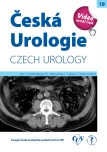IMMUNOSTIMULATION WITH POLYBACTERIAL LYSATE (URIVAC®) IN PREVENTING RECURRENT LOWER URINARY TRACT INFECTIONS
Authors:
Miroslav Hanuš 1; Michaela Matoušková 1; Vlasta Králová 1; Jan Hiblbauer, jr. 2; Jakub Szewczyk 3; Radek Sýkora 3; Riad Sabra 4; Peter Tomaštík 5; Jiří Paseka 6
Authors‘ workplace:
Urocentrum, Praha
1; Sanus, Hradec Hrálové
2; Urologické oddělení, FN Ostrava
3; Urolog, Praha
4; Urohelp, Brno
5; Leading Clinical Research
6
Published in:
Ces Urol 2015; 19(1): 33-43
Category:
Original Articles
Overview
In European countries, including the Czech Republic, urinary tract infections (UTIs) have long occupied the second place in the incidence of infectious diseases in the population, thus representing a major socioeconomic problem. Along with respiratory infections, they are the major contributors to the prescription of antimicrobial agents. Extensive antimicrobial therapy is one of the most important causes of increased bacterial resistance. Immunostimulation is a possible way of preventing recurrent lower urinary tract infections and reducing the consumption of antimicrobial agents.
A prospective multicentre study evaluated the clinical efficacy, tolerability, and benefit to treatment of recurrent infections with the immunostimulatory drug Urivac®.
The number of attacks of lower urinary tract infections following immunostimulation reduced significantly both during its course and after its cessation (p = 2.2 x 10–16). During immunostimulation, 85 % of patients were symptom-free, and during subsequent follow-up it was 70.8 %. There was associated with a reduction in the number of the antimicrobial agents administered. Subjective improvement persisted in more than 57 % even after treatment cessation. Microbiological response reached 77 %; it decreases with increased time from treatment cessation. In the case of exacerbations, uropathogenic flora was detected in 61 %. Adverse effects in two patients led to early termination of the therapeutic regimen.
KEY WORDS:
Immunomodulatory therapy, bacterial lysate, recurrent urinary tract infection (RUTI).
Sources
1. Bystroň J. Recidivující infekce a možnosti jejich ovlivnění imunomodulací. Med. Praxi 2010; 7(3): 115–121.
2. Bartoníčková K. Uroinfekce. Galén 2000, 79 s.
3. Petanová J. Imunostimulační terapie, rizika, přínosy, současné možnosti. Interní Med. 2011; 13 (9): 343–346.
4. Kotulová D. Návrh na štandardné metódy prípravy baktériových imunomodulačných stock vakcín. Acta Hygienica, Epidemiologica et Microbiologica, příloha č. 2, 1991. Praha: Inst. hygieny a epidemiologie.
5. Conti-Freitas LC, Foss-Freitas MC, et al. Effect of BCG stimulus on proinflammatory cytokine production in laryngeal cancer. Cancer Immunol Immunother. 2009; 58 : 25–29.
6. Fučíková T. Imunomodulace. In: Klinická imunologie v praxi (2. vydání). Praha: Galén; 1997 : 280–318.
7. Bystroň J. Bakteriální imunomodulátory – současné použití v klinické praxi. Remedia 2010; 20 : 298–304.
8. Petanová J. Imunostimulační léčba v urologii. Urol. praxi, 2013; 14(3): 100–103.
9. Bartoníčková K. Komentář k článku Petanové J. „Imunostimulační léčba v urologii“. Urol. praxi, 2013; 14(3): 103.
10. Bauer HW, Alloussi S, Egger G, et al. A Long-Term, Multicenter, Double-Blind Study of an Escherichia Coli Extract (OM-89) in Female Patients with Recurrent Urinary Tract Infections. European Urology, 2005; 47 : 542–548.
11. Grabe M, Bartoletti R, Bjerklund-Johansen TE, et al. Guidelines on Urological Infections. European Association of Urology 2014. http://uroweb.org/guideline/urological-infections/
12. Karen I, Kolek V, Matoušková M, et al. Antibiotická terapie respiračních, močových a kožních infekcí v ordinaci všeobecného praktického lékaře. Doporučené diagnostické a terapeutické postupy pro všeobecné praktické lékaře, aktualizace 2014 : 31.
13. Ha US, CHo YH. Immunostimulation with Escherichia coli extrakt: prevention of recurrent urinary tract infections. International J Antimicrob Agent 2008; 31 (Suppl 1): S63–67.
14. Bystroň J. Využití bakteriálních lyzátů v klinické praxi. Interni Med. 2012; 14 (1): 12–17.
15. Rugendorff EW. Immunological therapy of recurrent urinary tract infections with immunoactive E. coli fractions in women. Intern. Urogynecol. J. 1992; 3 : 174–184.
16. Sabra R. Vezikoureterální reflux, refluxová nefropatie a močové infekce. Praha 1995, Maxdorf-Jessenius.
17. Cruz F, Dambros M, Naber KG, et al. Recurrent Urinary Tract Infections: Uro-Vaxom, a New Alternative. European Urology 2009; Supplements, 8 : 762–768.
18. Bartoníčková K. Léčení infekcí močových cest v éře narůstající rezistence na antibiotika. Je imunomodulace smysluplná? Ces Urol, 2009; 1(13): 19–20.
19. Rejchrt M, Havlová K, Kříž J. Prevence recidivujících uroinfekcí intravezikální instilací kyseliny hyaluronové a chondroitinsulfátu u pacientů po míšním poranění. Urol. praxi 2015; 16(1): 43.
20. Proč užívat URIVAC. http://www.bioveta.cz/cs/humanni-divize/urivac.
Labels
Paediatric surgery Paediatric urologist Surgery Nephrology UrologyArticle was published in
Czech Urology

2015 Issue 1
- Possibilities of Using Metamizole in the Treatment of Acute Primary Headaches
- Metamizole at a Glance and in Practice – Effective Non-Opioid Analgesic for All Ages
- Metamizole vs. Tramadol in Postoperative Analgesia
- Spasmolytic Effect of Metamizole
- The Importance of Hydration in Wound Healing
-
All articles in this issue
- EFFECTS OF FREE RADICALS ON MALE FERTILITY AND AVAILABLE TREATMENT
- ONCOLOGICAL TREATMENT OF PENILE CANCER FROM THE POINT OF VIEW OF RADIATION ONCOLOGIST
- IMMUNOSTIMULATION WITH POLYBACTERIAL LYSATE (URIVAC®) IN PREVENTING RECURRENT LOWER URINARY TRACT INFECTIONS
- URINE TUMOUR ASSOCIATED TRYPSIN INHIBITOR (TATI) IN DIAGNOSIS AND PROGNOSIS OF TRANSITIONAL CELL CARCINOMA OF THE BLADDER
- COMMUNICATION BETWEEN A UROLOGIST AND A PROSTATE CANCER PATIENT DURING PHYSICIAN CONSULTATION
- THE COMPLICATIONS FOLLOWING RADICAL PROSTATECTOMY VIA OPEN OR LAPAROSCOPIC APPROACH, A COMPARISON OF RESULTS ACCORDING TO THE CLAVIEN SYSTEM SCALE
- COMPLICATIONS FOLLOWING LOCAL APPLICATION OF INORGANIC MATERIAL INTO THE SUBCUTANEOUS TISSUE OF PENIS
- EMPHYSEMATOUS PYELONEPHRITIS – DESCRIPTION OF SIX CASES
- RAPID PROGRESSION OF TRANSITIONAL CELL CARCINOMA OF LEFT KIDNEY WITH THROMBOSIS OF VENA CAVA INFERIOR
- LESS (LAPARO-ENDOSCOPIC SINGLE-SITE SURGERY) NEPHRECTOMY
- Czech Urology
- Journal archive
- Current issue
- About the journal
Most read in this issue
- IMMUNOSTIMULATION WITH POLYBACTERIAL LYSATE (URIVAC®) IN PREVENTING RECURRENT LOWER URINARY TRACT INFECTIONS
- COMPLICATIONS FOLLOWING LOCAL APPLICATION OF INORGANIC MATERIAL INTO THE SUBCUTANEOUS TISSUE OF PENIS
- ONCOLOGICAL TREATMENT OF PENILE CANCER FROM THE POINT OF VIEW OF RADIATION ONCOLOGIST
- EMPHYSEMATOUS PYELONEPHRITIS – DESCRIPTION OF SIX CASES
